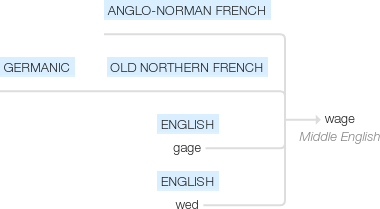Wage
Middle English: from Anglo-Norman French and Old Northern French, of Germanic origin; related to gage1 and wed.
wiktionary
From Middle English wage, from Anglo-Norman wage, from Old Northern French wage, a northern variant of Old French gauge, guage (whence modern French gage), Medieval Latin wadium, from Frankish *waddī (cognate with Old English wedd), from Proto-Germanic *wadją(“pledge”), from Proto-Indo-European *wedʰ-(“to pledge, redeem a pledge”). Akin to Old Norse veðja(“to pledge”), Gothic 𐍅𐌰𐌳𐌹( wadi), Dutch wedde. Compare also the doublet gage. More at wed.
From Middle English wagen(“to pledge”), from Anglo-Norman, Old Northern French wagier, a northern variant of Old French guagier (whence modern French gager), itself either from guage or from a derivative of Frankish *waddī, possibly through a Vulgar Latin intermediate *wadiō from *wadium.
etymonline
wage (n.)
c. 1300, "a payment for services rendered, reward, just deserts;" mid-14c., "salary paid to a provider of service," from Anglo-French and Old North French wage (Old French gage) "pledge, pay, reward," from Frankish *wadja- or another Germanic source (compare Old English wedd "pledge, agreement, covenant," Gothic wadi "pledge"), from Proto-Germanic *wadi- (see wed (v.)).
Also from mid-14c., "a pledge, guarantee, surety" (usually in plural), and (c. 1400) "a promise or pledge to meet in battle." The "payment for service" sense by late 14c. extended to allotments of money paid at regular intervals for continuous or repeated service. Traditionally in English wages were payment for manual or mechanical labor and somewhat distinguished from salary or fee. Modern French cognate gages (plural) means "wages of a domestic," one of a range of French "pay" words distinguished by class, such as traitement (university professor), paye, salaire (workman), solde (soldier), récompense, prix. The Old English word was lean, related to loan and representing the usual Germanic word (Gothic laun, Dutch loon, German Lohn). Wage-earner attested from 1871.
wage (v.)
c. 1300, "give (something) as surety, deposit as a pledge," from Old North French wagier "to pledge" (Old French gagier, "to pledge, guarantee, promise; bet, wager, pay," Modern French gager), from wage (see wage (n.)). Meaning "to carry on, engage in" (of war, etc.) is attested from mid-15c., probably from earlier sense of "to offer as a gage of battle, agree to engage in combat" (mid-14c.). Related: Waged; waging.
